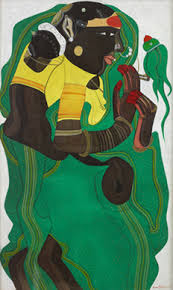Naming a progressive-rock group after a British agriculturist of 18th century, penning the songs, giving the lead by vocals, flute and acoustic guitar, selling 60 million albums worldwide, becoming a legend in a career spanning five decades…thats Ian Anderson for all of us. He took a sabbatical at the pinnacle of success, moved to a farm in the countryside and remained a bucolic since then. The man stands on one foot resting the other foot on his knee (see pic) while performing on stage.
This may not be a gimmick but it goes contradictory to the portrait of an original artist. I had a meditating Ian Anderson in mind. I listened to Jethro Tull first in 1979, while I was in college. “Songs from the Wood” was passed on to me by a junior, two years after its release. More than Ian Anderson’s steely voice and sharp fluting, I liked the effect the group produced which was similar to that of the ethereal sarpampattu at the sacred grove of my village every year.
I have a feeling that our likes or dislikes have a direct link to the imageries/scents/figures embedded in our subconscious. As a child, I watched the sarpampattu with awe, it turned out to be the primordial magician for me. Pulluvans – a tribe who made a living by singing songs eulogizing serpents were brought in to perform just for the occasion. They came in a three-member group, husband, wife and grandmother with their simple string instruments. The one for providing bass was assembled on the spot with an earthen pot at one end. The grandmother would handle it while the main artist, the husband sang and simultaneously played a violin-like instrument. The place, a small devi-temple by the sacred grove would be heavily decorated with plantain stems and tender coconut leaves with lighted diyas all over.
Songs from the Wood made a tremendous impact on me, one song in particular, a track titled Velvet Green. It had a familiar setting of Carnatic music, especially in the percussion part but I was just a novice to speak out my mind. The lyrics were ungraspable but a friend helped.
Walking on velvet green, distant cows lowing
Never a care: with your legs in the air, loving
Walking on velvet green
Tell your mother that you walked all night on velvet green
And the long grass blows in the evening cool
Where the scent of wild roses turns the milk to cream
But think not of that, my love,
I’m tight against the seam
And I’m growing up to meet you down on velvet green
Now I may tell you that its love and not just lust
We’ll dream as lovers under the stars
Of civilizations raging afar
And the ragged dawn breaks on your battle scars
As you walk home cold and alone upon velvet green.
(edited version)
Getting Jethro Tull albums was difficult as they were not released in India. Later, during my bachelor days in Mumbai, die-hard fans used to arrange local groups playing Tull songs. They were sell-out concerts (in spite of the high-priced entry ticket) with so many of us waiting outside Patkar Hall, desperate. Then the band would burst into “Too old to rock n’ roll”and the crowd gate-crash their way. The song summed up their predicament, at least mine in a sense.
Too old to Rock’n’Roll but too young to die
The song is about an “old Rocker who wore his hair too long” and remained “unfashionable till the end”. While “all of his mates are doing fine: married with three kids up by the Ring Road” the old Rocker was a loner, depressed and ridiculed. He never knew that his peers “sold their souls straight down the line”.
Thankfully, the last line of the song turns everything for the good.
No, you’re never too old to Rock’n’Roll if you’re too young to die.
The line acted as a tranquilliser.
Towards the end of my Mumbai days, a friend who had roots in England told me that Ian Anderson learnt his fluting techniques from our own T.R.Mahalingam (Mali). Quite possible as Mali was married to a British lady and was staying abroad for a while. I researched a little bit on the subject but couldn’t find any material substantiating the claim.
As always, the truth is covered with a golden casket.




